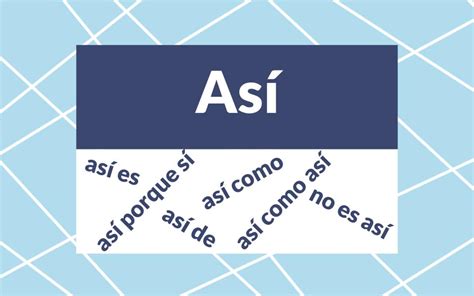In many languages, there are expressions that can be tricky to translate directly into English. One such phrase is "Así así," which is commonly used in Spanish-speaking countries. In this article, we'll delve into the meaning and usage of "Así así" and explore its nuances.
What does "Así así" mean?
"Así así" is a Spanish phrase that can be translated to English in various ways, depending on the context. Some possible translations include:
- "Just so" or "So-so"
- "Okay" or "Alright"
- "It's all right" or "It's fine"
- "That's the way it is" or "That's how it goes"
The phrase is often used to convey a sense of resignation, acceptance, or neutrality. It can also be used to express that something is not particularly good or bad, but rather mediocre or average.
How to use "Así así" in conversations
Here are some examples of how to use "Así así" in conversations:
- When someone asks how you're doing, you can respond with "Así así" to indicate that you're not feeling particularly well or enthusiastic, but you're managing.
- "¿Cómo estás?" ("How are you?")
- "Así así" ("Just so")
- When discussing a situation that's not ideal, but you can't change it, you can use "Así así" to express resignation.
- "No me gusta el clima aquí" ("I don't like the weather here")
- "Así así, es parte del lugar" ("Just so, it's part of the place")
- When someone asks if you want to do something, and you're not particularly excited about it, you can respond with "Así así" to indicate that you're willing to go along with it.
- "¿Quieres ir al cine esta noche?" ("Do you want to go to the movies tonight?")
- "Así así, si quieres" ("Just so, if you want")
Cultural nuances of "Así así"
In many Spanish-speaking cultures, "Así así" is a common way to express a sense of acceptance or resignation. It's often used to avoid conflict or controversy, as it implies that you're not particularly invested in a particular outcome.
For example, if someone asks you if you like a particular food, and you don't want to offend them, you can respond with "Así así" to indicate that it's okay, but not necessarily your favorite.
Image

Variations of "Así así"
There are several variations of "Así así" that can be used in different contexts. Some common variations include:
- "Así es" (literally "That's how it is")
- "Así pasa" (literally "That's how it goes")
- "Así va" (literally "That's how it goes")
These variations can be used to convey slightly different shades of meaning, but they all generally convey a sense of acceptance or resignation.
Conclusion
In conclusion, "Así así" is a versatile phrase that can be used in a variety of contexts to convey a sense of acceptance, resignation, or neutrality. Whether you're discussing a particular situation, expressing your feelings, or simply responding to a question, "Así así" can be a useful phrase to have in your linguistic toolkit.
We hope this article has helped you understand the meaning and usage of "Así así" in Spanish. Remember to use it in context, and don't be afraid to experiment with different variations to convey different shades of meaning.
Gallery of Spanish expressions





FAQ
What does "Así así" mean in Spanish?
+"Así así" is a Spanish phrase that can be translated to English as "Just so" or "So-so." It's often used to convey a sense of acceptance or resignation.
How do I use "Así así" in conversations?
+You can use "Así así" to respond to questions, express your feelings, or discuss a particular situation. For example, you can say "Así así" to indicate that you're not particularly excited about something, but you're willing to go along with it.
What are some variations of "Así así"?
+Some common variations of "Así así" include "Así es," "Así pasa," and "Así va." These variations can be used to convey slightly different shades of meaning, but they all generally convey a sense of acceptance or resignation.
